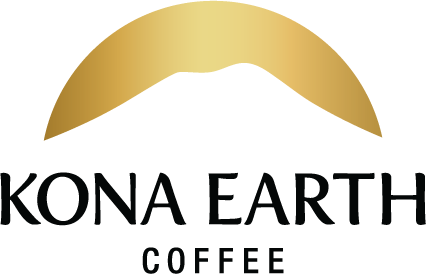Owning a Kona coffee farm in Hawaii is a dream for Kona Earth owners Steve and Joanie Wynn. The unique climate and rich volcanic soil of the Kona region create the perfect conditions for growing some of the most sought-after coffee beans in the world. But what are the rewards of owning a Kona coffee farm? Here's our perspective:
Premium Quality Coffee Beans
Kona coffee is renowned for its exceptional quality and flavor profile. The combination of sunny mornings, cloudy afternoons, and mild nights in the Kona region results in smooth, full-bodied coffee beans rich in flavor. As a Kona coffee farm owner, you can produce some of the world's most coveted and premium coffee beans. Coffee enthusiasts and connoisseurs recognize the coffee produced in this region as some of the finest in the world.
High Demand and Premium Prices
Authentic Kona coffee can only be grown in a small geographical area known as the Kona coffee belt. The region is only about thirty miles long and two miles wide. This means, that only so many farms are growing Kona coffee in this region, limiting the supply of Kona coffee beans.
Due to its limited production and exceptional quality, 100% Kona coffee commands premium prices. Those in the know will pay top dollar to taste this unique and flavorful brew. As a Kona coffee farm owner, you can benefit from this exclusive coffee varietal's limited supply, high demand, and premium prices.
Cultural Experience and Heritage
Owning a Kona coffee farm is also a cultural experience. The Kona region has a long history of coffee cultivation, dating back to the early 1800s, and being a part of this tradition makes you feel a connection to Hawaii's rich heritage of coffee farming.
Tourists visiting the island are keen to see a coffee farm up close and personal. This gives Kona coffee farmers another revenue opportunity, shares the rich history of Hawaiian coffee farming, and educates visitors on what it takes to grow this exceptional specialty coffee.
Sustainable Farming Practices
Many Kona coffee farms are committed to sustainable and eco-friendly farming practices. Owning a Kona coffee farm can contribute to environmental conservation efforts, promote biodiversity, and support the local ecosystem. Sustainable farming practices benefit the environment and enhance the quality of the coffee beans produced.
For example, cherry skins removed during pulping can be composted and then put back into the fields as a great form of fertilizer. Likewise, weedwacking instead of using an herbicide for weed control puts nitrogen-rich material back into the fields. Better for the environment and better for the development of great-tasting beans.
Community Engagement and Support
Owning a Kona coffee farm allows you to be an active member of the local community and support the livelihoods of farmers and workers in the region. By creating jobs, fostering economic growth, and participating in community events, you can make a positive impact on the social fabric of the Kona coffee industry.
A very supportive community of Kona coffee farmers supports one another. We share a friendly rivalry but are always ready to lend a hand. We commiserate when times are challenging and share tips and tricks for orchard management. It's a different kind of "shop talk" than you might find in other businesses, but there is genuine camaraderie that is rewarding to be a part of.
Many Opportunities to Sell Your Coffee
As a coffee farm owner, there are myriad ways to sell your Kona coffee beans. Some farmers sell their coffee cherry to larger producers. This is especially true for Kona coffee growers who don't own any processing equipment and don't wish to go to the expense or trouble of hauling their crop to a processing facility.
Other Kona coffee growers focus on selling their green beans, which have been fully processed and are suitable for roasting. The wholesale market for green coffee includes everything from small, boutique roasters to large coffee brands with a specialty coffee niche or international buyers looking to sell within their own countries.
Finally, Kona coffee farmers can sell roasted coffee beans. They can do this through bulk sales to retail outlets, resellers, or direct-to-consumer. Many farmers' markets welcome Kona coffee farmers who wish to sell to locals and visitors. Finally, with the emergence of e-commerce platforms like Amazon and Shopify, it's never been easier for farmers to sell their coffee directly to customers as a retail roasted product.
Many Kona coffee farms have developed a brand name and worked to create a lasting relationship with their customers. They offer coffee subscriptions and multiple options in different Kona coffee grades and roast profiles. This enhances the relationship of Kona coffee as a whole and is another opportunity for growers to reach and educate customers directly.
For husband and wife Kona Earth owners Steve and Joanie Wynn, owning a Kona coffee farm is a career pivot. They traded a 30-year career in television production for the fields of a coffee farm in Kona. Steve loves the daily tasks of farming, processing coffee, and roasting. Joanie is fully engaged in growing the e-commerce retail business and managing fulfillment, shipping, and customer service. The days can be long and, at times, challenging, but the lifestyle is a fantastic change of pace with new challenges and rewards.
In addition to the incomparable sunsets, owning a Kona coffee farm in Hawaii offers many rewards—from producing premium-quality coffee beans to engaging with the local community and supporting sustainable farming practices. It is a unique and fulfilling experience that combines passion, heritage, and entrepreneurship in the picturesque setting of the Kona region.


